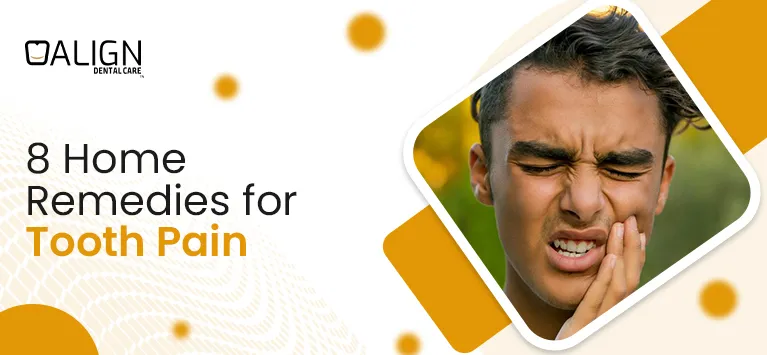How to Kill Tooth Pain Nerve in 3 Seconds Permanently at Home?

Tooth nerve pain can be very painful, making it hard to eat or even focus. It can happen because of cavities, broken teeth, or gum problems. Many people search for quick solutions to kill tooth pain nerve in 3 seconds permanently at home, hoping to find relief. While home remedies may provide temporary relief, addressing the root cause of the problem often requires professional care. In this blog, we will learn about effective home remedies for temporary relief, why they aren’t permanent solutions, and when it’s time to seek professional dental care for lasting relief.
What Causes Tooth Nerve Pain?
Tooth nerve pain is often a result of irritation or inflammation of the inner pulp of the tooth, where sensitive nerves and blood vessels are located. Common causes include:
- Cavities: Bacteria erode the enamel, exposing the nerve.
- Cracked or broken teeth: Opening pathways for bacteria to irritate the pulp.
- Gum disease: Leading to receding gums and nerve exposure.
- Dental trauma: Injuries that directly impact the tooth structure and nerve.
Understanding these causes is essential for determining the right approach to kill tooth pain nerve in 3 seconds permanently at home or with professional intervention.
Home Remedies for Killing Nerve in Tooth
Although it is not possible to kill tooth pain nerve in 3 seconds permanently home remedies, certain methods can offer temporary relief. Below are some effective home remedies for killing nerve in tooth:
1. Clove Oil
Clove oil contains eugenol, a natural compound with anaesthetic and anti-inflammatory properties. It is one of the most effective remedies for nerve pain.
- Soak a cotton ball in clove oil.
- Place it directly on the painful tooth for a few minutes.
- Repeat this process twice daily for maximum effect.
2. Saltwater Rinse
Saltwater helps reduce inflammation and eliminates bacteria in the mouth, providing temporary relief from nerve pain.
- Mix a teaspoon of salt in a glass of warm water.
- Swish the solution in your mouth for 30 seconds before spitting it out.
- Repeat this remedy twice daily.
3. Cold Compress
A cold compress can numb the area and reduce swelling, offering quick relief for tooth nerve pain.
- Wrap ice or a cold pack in a cloth.
- Hold it against the affected area for 15-20 minutes.
- Use this remedy twice a day to reduce discomfort.
4. Hydrogen Peroxide Rinse
Hydrogen peroxide can clean the mouth and reduce bacterial growth, alleviating tooth nerve pain temporarily.
- Mix equal parts of 3% hydrogen peroxide and water.
- Swish the mixture in your mouth for 30 seconds.
- Rinse thoroughly with water. Repeat no more than twice daily.
5. Garlic Paste
Garlic has natural antimicrobial properties that can help with nerve pain.
- Crush a garlic clove to create a paste.
- Apply the paste to the painful tooth.
- Let it sit for a few minutes before you rinse your mouth.
- Use this remedy twice a day for relief.
6. Over-the-Counter Pain Relievers
Non-prescription painkillers can help manage pain. These provide temporary relief but do not kill tooth nerve permanently.
Why Home Remedies Are Not a Permanent Solution
While these remedies can reduce symptoms and provide temporary relief, they cannot kill tooth pain nerve in 3 seconds permanently. Addressing the root cause, such as an infection or decay, requires professional dental care. Ignoring persistent nerve pain can lead to severe complications, including abscesses or the loss of the affected tooth.
Permanent Methods to Kill Tooth Pain Nerve
Root Canal Treatment
One of the most reliable and permanent solutions to eliminate a tooth nerve is a root canal treatment. This process includes:
- Extracting the infected or damaged pulp, which contains the nerve.
- Thoroughly cleaning and disinfecting the inner chambers of the tooth.
- Sealing the tooth to guard against future infections.
Advantages:
- Retains the natural tooth structure.
- Provides permanent relief from nerve pain.
Disadvantages:
- Mild discomfort during the procedure.
- Comparatively high cost.
This approach ensures that you can effectively kill tooth pain nerve in 3 seconds permanently during the procedure, delivering prompt and enduring relief.
Tooth Extraction
In cases where the tooth is beyond saving, tooth extraction becomes a viable option. The procedure involves:
- Completely removing the affected tooth, including its root and nerve.
- Optionally replacing the tooth with an implant or bridge for functionality and aesthetics.
Advantages:
- Offers immediate relief from severe nerve pain.
- Prevents the risk of infection spreading.
Disadvantages:
- Loss of the natural tooth.
- It may require additional procedures for replacement.
Dental Nerve Ablation
This advanced dental technique targets and eliminates the tooth nerve using lasers or chemical agents without the need to remove the tooth. It serves as a modern alternative to traditional treatments.
Advantages:
- Minimally invasive approach.
- Faster recovery period.
Disadvantages:
- Not suitable for all dental conditions.
- Potential need for follow-up treatments to ensure long-term results.
When to See a Dentist
It’s important to consult a dentist if:
- Pain persists despite using home remedies.
- Swelling or fever develops.
- There is visible pus or discharge near the affected tooth.
- The pain interferes with your daily life.
Professional dental care ensures a comprehensive solution to how to relieve tooth nerve pain and prevent further complications.
Final Thoughts on Killing Tooth Pain Nerve at Home
While it may not be possible to permanently kill tooth pain nerve in 3 seconds with home remedies, several temporary solutions can offer relief. Remedies like clove oil, salt water rinses, cold compresses, and over-the-counter pain relievers can help manage symptoms, but they do not address the underlying cause. For permanent relief, treatments such as root canals, tooth extraction, or nerve ablation performed by a dental professional are necessary. If tooth nerve pain persists, it is crucial to consult a dentist to prevent further complications and ensure long-term oral health.
8 Home Remedies for Tooth Pain

Tooth pain can strike at any time, often when least expected. Whether it’s a dull ache or a sharp, throbbing pain, it can disrupt daily activities and make it hard to concentrate. It’s always best to see a dentist for persistent or severe tooth pain. Meanwhile, several effective home remedies can provide temporary relief. These remedies use common household items and natural ingredients, making them easily accessible and simple to use. This blog will explore eight tried-and-true home remedies for tooth pain. It will also offer detailed explanations and tips for each method to help you find relief.
Salt Water Rinse
Saltwater is a natural disinfectant that can help reduce inflammation and heal oral wounds. It’s one of the simplest and most effective remedies for tooth pain.
How to Use a Salt Water Rinse
- Preparation: Dissolve 1/2 teaspoon of salt in a glass of warm water.
- Usage: Swish the solution around your mouth for about 30 seconds before spitting it out.
- Frequency: Repeat this process up to three times a day.
Using a salt water rinse can help cleanse the area around the affected tooth, reduce swelling, and promote healing. It’s a gentle method suitable for all ages.
Cold Compress
A cold compress is particularly effective for reducing tooth pain caused by trauma or swelling. It helps numb the affected area and reduces inflammation.
How to Apply a Cold Compress
- Preparation: Wrap some ice cubes in a thin cloth or use a cold pack.
- Application: Apply the compress to the outside of the affected area for 15-20 minutes.
- Frequency: Repeat every few hours as needed.
Using a cold compress is a quick and easy way to alleviate pain and reduce swelling, making it a go-to remedy for many people.
Clove Oil
Clove oil contains eugenol, a natural antiseptic that can reduce pain and inflammation. This remedy has been used for centuries to treat tooth pain.
How to Use Clove Oil
- Preparation: Dab a small amount of clove oil onto a cotton ball.
- Application: Apply the cotton ball directly to the painful area, or mix a few drops in a small amount of water and use it as a mouthwash.
- Caution: Avoid direct contact with gums as it can irritate.
Clove oil provides quick relief from tooth pain and can be a powerful remedy, especially when you need immediate pain relief.
Peppermint Tea Bags
Peppermint tea bags can soothe sensitive gums and numb the pain. This method is gentle and works well for mild to moderate tooth pain.
How to Use Peppermint Tea Bags
- Preparation: Brew a peppermint tea bag in hot water and let it cool slightly.
- Application: Apply the warm, damp tea bag to the affected area for about 20 minutes.
- Alternative: Use a cooled tea bag if you prefer a cold compress effect.
Peppermint tea bags not only help with tooth pain but also leave your breath feeling fresh and clean.
Hydrogen Peroxide Rinse
A hydrogen peroxide rinse can help kill bacteria, reduce plaque, and alleviate pain. It’s particularly useful for gum disease or infections.
How to Use a Hydrogen Peroxide Rinse
- Preparation: Mix equal parts of 3% hydrogen peroxide and water.
- Usage: Swish the mixture around your mouth for about 30 seconds, then spit it out.
- Caution: Avoid swallowing the rinse and rinse your mouth with plain water afterwards.
Using a hydrogen peroxide rinse can help disinfect the mouth and reduce bacterial buildup, which can provide relief from tooth pain caused by infections.
Garlic
Garlic has natural antibacterial properties and can provide significant relief from tooth pain. It can kill harmful bacteria and act as a pain reliever.
How to Use Garlic for Tooth Pain
- Preparation: Crush a garlic clove to release its juice.
- Application: Apply the crushed garlic directly to the affected tooth or chew a clove gently.
- Alternative: Mix the crushed garlic with a little salt before applying.
Garlic is a powerful natural remedy that can help alleviate tooth pain and fight off infections.
Vanilla Extract
Vanilla extract has alcohol in it, which can assist in numbing the pain. Its antioxidant properties can also aid in healing.
How to Use Vanilla Extract
- Preparation: Pour a small amount of vanilla extract onto a cotton ball or your fingertip.
- Application: Apply it directly to the affected tooth and gums.
- Frequency: Use this remedy up to three times a day.
Vanilla extract is a sweet-smelling and effective solution for tooth pain relief, making it a popular choice.
Guava Leaves
Guava leaves have anti-inflammatory and antimicrobial properties that can help soothe tooth pain and reduce swelling.
How to Use Guava Leaves
- Preparation: Chew on fresh guava leaves or boil them in water to make a mouthwash.
- Application: If using as a mouthwash, let the solution cool and swish it around your mouth.
- Frequency: Use this remedy a few times a day for best results.
Guava leaves offer a natural and effective way to manage tooth pain, especially when you prefer herbal remedies.
Finishing Up
Tooth pain can be a distressing experience, but these home remedies provide accessible and effective options for temporary relief. While these methods can help manage pain, it’s important to consult a dentist to address the underlying cause of tooth pain. Regular dental check-ups and good oral hygiene practices are essential for maintaining healthy teeth and preventing future discomfort. By incorporating these home remedies into your routine, you can find relief from tooth pain and ensure better oral health.















